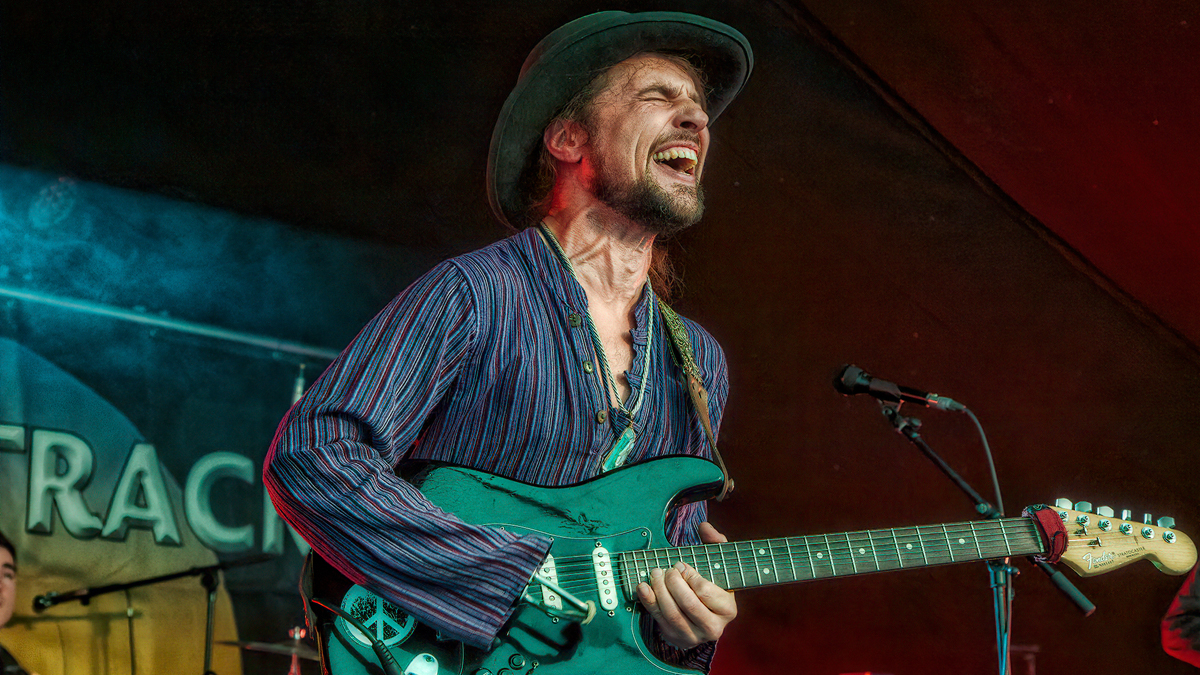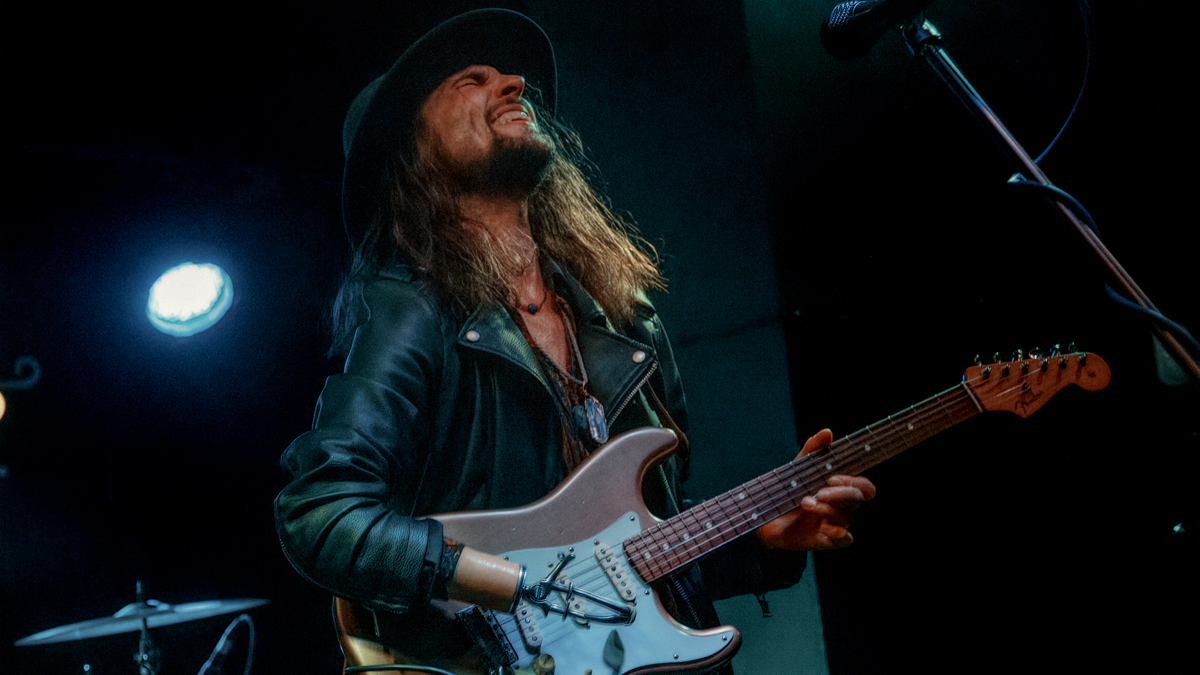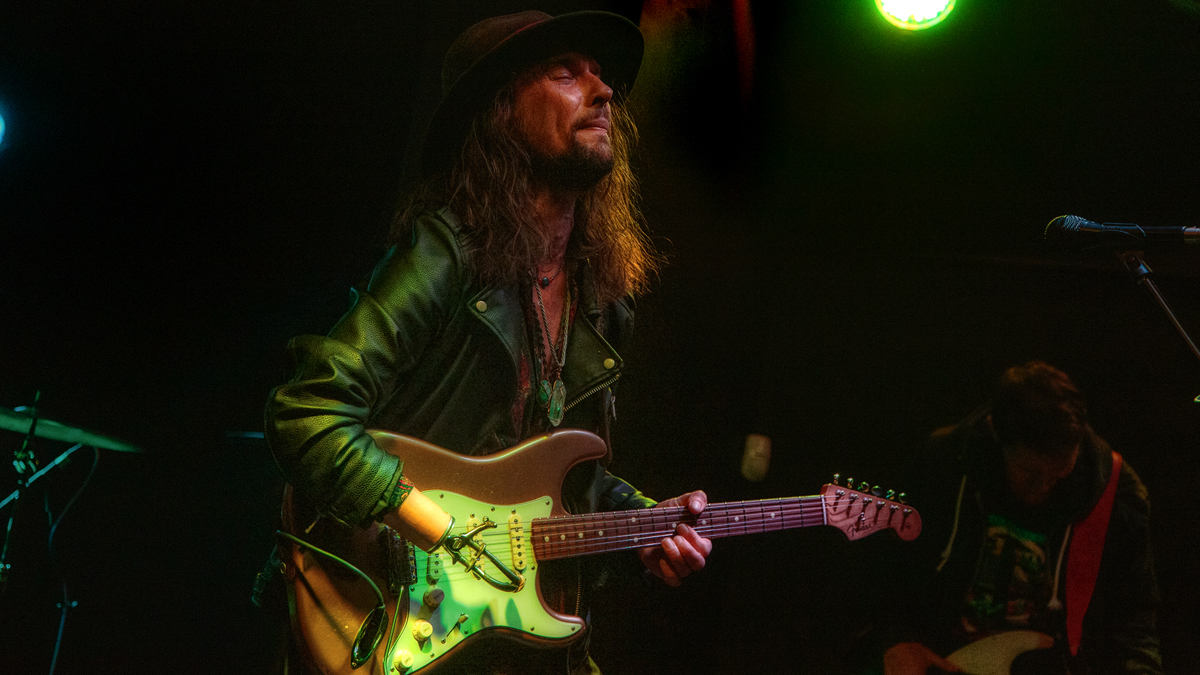Keith Xander on his one-armed guitar technique: “It takes a lot of time to learn an instrument, maybe even more so in my case”
Ahead of the release of his band's new album, Order Out of Chaos, the guitarist discusses his unique picking method, balancing theory with freedom and how he adjusted his technique to forge his guitar path

“Playing with only one arm taught me a lot of patience, because in the beginning I couldn’t even hit the strings,” says Keith Xander, singer and guitarist of Xander and the Peace Pirates. “If I can do it, anyone can.”
Having been born without a right arm below the elbow, Xander’s words ring with an overwhelming sense of hope and inspiration – a testament to the resilience of the human spirit when it comes to following our hearts and realizing our dreams.
Using a prosthesis and hook with a plectrum on its end, he’s able to deliver breathtaking leads that dazzle every bit as much as those from the guitar heroes he’s supported in recent years, from Joe Satriani to Joe Bonamassa and Richie Kotzen.
While there are guitarists who have enjoyed fruitful careers after physical setbacks – from Tony Iommi losing the tips of his middle and ring fingers in a factory accident, to the fire that cost Django Reinhardt two of his left digits – Xander’s story of overcoming the odds is one that truly defies expectations. If people come to his shows and walk away feeling inspired, that’s precisely what it’s all about, he explains.
“Everything comes down to inspiration,” says Xander. “The guitarists I listened to made me want to keep going and not give up. I learned not to be so hard on myself. All artists and musicians can be very impatient with themselves. It takes a lot of time to learn an instrument – maybe even more so in my case.”
Naturally, the Xander and the Peace Pirates frontman has had to adjust certain elements of his technique accordingly and forge his own path as a player. He prefers to be more legato-led, partly because he likes the slippery sound it yields, but also because that’s simply what feels most comfortable with his setup.
“I keep my wrist quite still and move the forearm, because I’ve got no choice in the matter, really. I’ve got no wrist!” he continues. “I don’t really use much alternate picking. It’s a lot of downstrokes, and then I compensate with my fretting hand to get speed and fluidity through legato techniques. I worked on that stuff a lot through the years, using one hand to play leads and get melodies flowing.
Get The Pick Newsletter
All the latest guitar news, interviews, lessons, reviews, deals and more, direct to your inbox!
“So my style is mainly through my left hand. The right hand, or right hook, in my case, is really just for striking the strings to get going. I like the sound of legato; it’s more smooth and less harsh compared with picking every note. Richie Kotzen is great for that stuff, and I love his playing. We supported him as well a little while back, that was another cool gig. I loved his Tele sound.”

What can you tell us about how your picking works?
“I tend to use the nylon Jim Dunlop 88mm plectrums. I wedge one of those into my split hook, which is basically a hook with two prongs that come together. Then I fasten them with elastic bands so the two hooks clutch around the plectrum with extra tension to keep it in place. That’s pretty much it!”
On your new album, Order Out of Chaos, it very much sounds like you’ve cast quite a wide creative net that spans blues, country and pop.
“Sure. I love players like Jonny Lang and Prince, and a lot of artists who sing and play guitar, including Hendrix. But I’ll learn from anyone who gives me tingles and makes me feel emotion. It tends to be songwriters who resonate with me most, but when it comes to pure guitar heroes, Robben Ford has always been an idol of mine.
“We got to support him a few years ago in Germany, which was cool. I love his note choices. He approaches his soloing from a place of improvisation, almost composing on the spot. But I love all kinds of music. If it touches my heart and soul, I’ll keep on listening. There’s another guy called Foy Vance, he’s a great songwriter, as is Springsteen. I might not hear that in our music, because that’s within its own realm.”
You’ve supported some guitar giants over the years. What did you learn from them?
“For a lot of those we didn’t get much of a chance to sit around and talk. But I got to have a quick chat with Joe Bonamassa, who was lovely and down-to-earth. It meant a lot to meet someone that kind and open. I can hear a lot of influences in his music, and he’s a very versatile guitarist.
“He can mimic certain players, like Eric Johnson – I can hear a lot of that in his fast pentatonic runs. There’s no doubt he’s an incredible player, though, no offence to Joe, I don’t really listen to his music. The players I listen most to, I listen to for the songs and the content of the lyrics, and how all of that resonates with some kind of message.”
You cut your teeth through a residency at the Cavern Club before relocating to London. That must have been a great place to get the band going.
“Yeah, that went on for five years, and we used to have the place rammed on Sundays. We’d play a mixture of covers and our own stuff. That was an early incarnation of the Peace Pirates band, though. It’s a different line-up now. In some respects, it was more playful because we used to jump around and go crazy. There was a lot of showboating.
“These days it’s more about the emotional content of the songs and playing nice-sounding, thought-out solos rather than improvising. I love Paul Kossoff’s solos in Free. You can’t not play the solo from All Right Now. You can try, but it’s part of the song.
“The Cavern was an amazing gig, even though it wasn’t actually the original Cavern itself. We got to meet people from all over the world which was awesome. It was a great experience.”
You’re seen playing a black Fender Strat in the performance video for your new song Leave The Light On. Tell us more about that guitar.
“It’s an American Strat from the mid-'80s with a rosewood neck. It had Texas Special pickups but I recently upgraded to some Lindy Fralins, which I’ve been enjoying. Because I have the volume and the tone controls bypassed, the guitar ends up being more treble-y, and with the Texas Specials the sound was a little too shrill.
“It was struggle getting the balance right. The new pickups work a lot better for me. I’ve also used a Fender Telecaster on our recordings, as well as Gibson ES-335s and even a Gibson Midtown, which I had for a while.”

What were you using for amps and effects on the new record?
“For my lead sound I used the Z.Vex Box Of Rock and a Visual Sound Open Road overdrive pedal, which I use as a boost pedal for my Two-Rock guitar amp. A lot of the big reverb sounds comes from my Line 6 Helix effects – that thing is great for padding out chords and adding new tones.”
The opening track, We Cry, has some really creamy octave fuzz. What was that coming from?
“For that solo, I was using the Scott McKeon Octave Fuzz. That thing just cuts through, so it worked perfectly for the solo there. And for the big fat riff at the end, I think I was using my Tele. When we play live, I’ll just use the octave fuzz on the Line 6 – it’s got some really awesome sounds on it and it’s already in the rig. It’s super versatile, I even used it for the rotary tones on Kiss Your Rain, plus some tremolos here and there.”
And what wah pedal are we hearing on Soul Sailing, out of curiosity?
“I can’t quite remember because it’s been so long since we recorded it. We made the album and then started looking around for a deal, eventually hooking up with BFD who helped us get these singles out. It was either a Jimi Hendrix Cry Baby that was based on an old Vox wah pedal, or it might have been an actual old Vox. It was most likely the Vox, as I’ve got a few of them lying around at home.”
There’s some great slide playing on Fog. Was that you as well?
“Our other guitarist, Mike Gay, plays slide in the band – and you’re right, his parts on this track came out great. He also produced the album and engineered it. He’s inspired by Derek Trucks and that whole Allman Brothers sort of sound. I love his playing and he’s a great guy. It’s nice to play with someone who always has a great tone and sound. It definitely inspired me a lot.
I’ve never been much of a gear guy. My approach is if it sounds good then use it, but don’t get caught up in it
“I’ve never been much of a gear guy. Mike’s helped me a lot with that stuff, because I guess I’m not technically minded in that way. My approach is if it sounds good then use it, but don’t get caught up in it.”
Well, it helps when you have a nice '80s Strat going through a Two-Rock!
“Yeah, I guess! These things just landed in front of me and sounded great. If I can get a good sound then I won’t need to go out looking for anything else. I’ve also got this nice little Laney at home, which sounds amazing. It’s just about whatever works best for the tone – on the album, it was the Two-Rock and even a Kemper for a couple of tracks.
“Some people say they can tell the difference, but honestly, once it’s in the mix and produced properly, it’s very hard – or maybe impossible – to tell the difference. It blows my mind. Technology has become so advanced. Obviously, it will never beat having a big fat valve amp behind you, like a Fender Twin. I’d love to have a Dumble, but I hear they’re a bit pricey!”
When it comes to your lead work, how much do scales and theory play a part?
“I learned my modes, scales and chords growing up – particularly through tuition videos I’d seen of Robben Ford, and by just listening to him play. But most of the time I’m playing what I hear in my head. I try to use my ear a lot. You can learn all the modes, how they all work together and that stuff, and it is useful, but really it’s just a tool to get there. I like composing, almost painting a picture in my mind and trying to manifest it into some kind of song or composition.”
As well as those choice notes, there’s something incredibly rhythmic about the lead style popularized by players like Robben Ford and Larry Carlton.
“Exactly! Robben’s rhythms are perfect. That’s why his phrasing is so beautiful, and that’s why I think a lot of players admire him. And yeah, the same goes for Larry Carlton – it’s all in the phrasing and feel.
Every guitar player knows there are certain artists that just touch your heart – they end up being the ones you learn from the most
“Stevie Ray Vaughan and Hendrix were early influences for me. I think SRV’s passion and energy was something else. You can hear it in every note he played. There was that gig he did at Austin City Limits – I think it’s one of the last ones he did – and I’d watch footage religiously, and it would always blow me away.
“When I was a kid, I’d watch the Woodstock documentary and things like that. I loved the ’60s vibe and the freedom that came with it. Every guitar player will know there are certain artists and eras that just touch your heart – they end up being the ones you learn from the most.”
- Order Out of Chaos is available to preorder now ahead of its release on May 6.
Amit has been writing for titles like Total Guitar, MusicRadar and Guitar World for over a decade and counts Richie Kotzen, Guthrie Govan and Jeff Beck among his primary influences as a guitar player. He's worked for magazines like Kerrang!, Metal Hammer, Classic Rock, Prog, Record Collector, Planet Rock, Rhythm and Bass Player, as well as newspapers like Metro and The Independent, interviewing everyone from Ozzy Osbourne and Lemmy to Slash and Jimmy Page, and once even traded solos with a member of Slayer on a track released internationally. As a session guitarist, he's played alongside members of Judas Priest and Uriah Heep in London ensemble Metalworks, as well as handled lead guitars for legends like Glen Matlock (Sex Pistols, The Faces) and Stu Hamm (Steve Vai, Joe Satriani, G3).
Ozzy Osbourne’s solo band has long been a proving ground for metal’s most outstanding players. From Randy Rhoads to Zakk Wylde, via Brad Gillis and Gus G, here are all the players – and nearly players – in the Osbourne saga
“I could be blazing on Instagram, and there'll still be comments like, ‘You'll never be Richie’”: The recent Bon Jovi documentary helped guitarist Phil X win over even more of the band's fans – but he still deals with some naysayers










